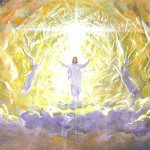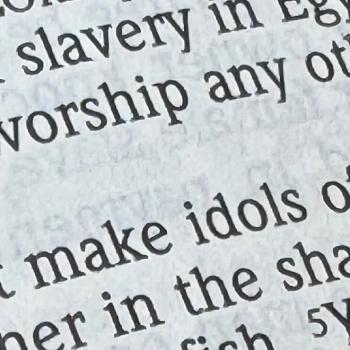The priest says this, then holds the wafer aloft. The bells ring and the church falls silent.
“This is My body.” This bread, that, in the words St Faustina gave us, is the body and blood, soul and divinity” of Our Lord and Savior Jesus Christ.
This is My body … the body He spoke of when He said, “he who eats of my flesh … shall never die.”
If this is true, then nothing else matters.
If it’s a lie, nothing matters at all.
A few years ago, an atheist friend of mine leaned over the lasagna on the dinner table between us and said, “Life is nothing, really. You’re born. You live. You die. None of it matters.”
That is the existential reality of unbelief. That simple statement represents our ultimate reality if we are nothing but animated matter. Unbelief is not the liberating viewpoint its proponents like to claim. After those who fall prey to it get past the ‘freedom” to use and be used, to break all the rules and kick over all the barriers of passé Christian morality, they inevitably arrive at the great alone where life without meaning, living without hope defines their reality.
The question of whether or not the priest’s words are true when he proclaims “This is my Body” and elevates that wafer involves a lot more than whether or not there is more to us than they can take apart in an autopsy. It is more than the gift of life after death. What it represents is life, not just after death, but before it, as well.
I lived about 17 years of my life in rebellion against God. I had my reasons. Even now I think they were rather good ones. During those years, I lived as my own god. I decided what was right and wrong. I made my own rules. And I lived by them.
I did many of the things that people who attack Christianity do today. I made fun of churches when talking to my friends. I was ardently pro-choice, and that led me into an active dislike of Christianity and the power of Christian witness. I joined Americans United for Separation of Church and State and I looked forward to the day when churches would lose their tax status. My reason was simple: I wanted the voice of faith to go silent so that I could do what I wanted without anyone trying to tell me no. I was perfectly free to walk my own path, but I didn’t like the constant push back from people of faith about what I was doing.
It was as simple, and as selfish, as that.
What I didn’t reckon with was that being your own god has a peculiar price attached to it that no posturing unbeliever ever mentions. Not only can you be your own petty god, but you must be your own god. Not only can you set your own rules and define your own morality, but you must set your own rules and define your own morality. And when you do harm to others, as you will, the remorse you feel is as cold and pitiless as the philosophy that brought you here.
I never got to the point my friend described in the restaurant that night. I was still young and healthy, with my own eventual death a long way off in a future I couldn’t imagine, much less see. There wasn’t any emotional head-butting against the hard wall of my own mortality. I just failed at being a good person.
Without the “rules” I so despised, I tripped over the edge of what I knew was right and tumbled soul-first into the world of doing what I knew was wrong. The obfuscations worked for years. They tamped down the unease, silenced the questions and made me feel just fine about myself. But there came a day when the truth broke through and I found myself face to face with the fact that I had hurt other people.
Being your own god means that you will come to a day when you either have to face the harm you have done and are doing to other people and change your ways, or you will chose to ignore it and give yourself away to a life of indifference about the pain you cause. If you go the first direction, you will plunge into the pain of remorse and grief. If you go in the second, you sentence yourself to the dry living and lonely dying of life as your own useless god.
I took the first course. It was while I was on that path of remorse and grief that I reached out to the God I had pushed away for so long. I discovered that He was right there, He was real and He loved me with a love like nothing I had ever experienced before.
As usual, there were a lot of things I didn’t reckon with in that turning to God. One of the most important was that the experience of knowing Him re-oriented my view of myself and life. When you look at the world through godless glasses, what you see is what my friend described to me. “Life is nothing. You’re born. You live. You die. None of it matters.”
That is the atheist life view. It is the inevitable and unavoidable conclusion to the belief that reality has no spiritual dimension and that there is nothing to existence but the material universe. Life is nothing. We are nothing. None of it matters.
There comes a point in the life of every person I’ve known who holds this life view when bitterness and anger seem to overwhelm them. The self-portrait atheists peddle to others of themselves as urbane philosophers with a cogent and rational grip on reality doesn’t hold up when you spend much time with them. I lived 17 important years of my adult life with unbelievers as their fellow unbeliever. I know a lot of people who are atheists. I’ve seen them go through all sorts of life situations.
One of the things that is most jarring when I watch them is how their bitterness increases with time. These are tormented people who are trapped in an arid view of life that offers no hope or meaning.
Christianity, on the other hand, provides meaning and symmetry to all of life, including some of its worst happenings. Life matters when you are a Christian, all of life, every life. What you do matters. You matter.
Life for a Christian is more than eternal. Living life forever with a worldview as arid and hopeless as that of the atheist would be a sentence, not a gift. But life when it is viewed through the lens of faith, is rich with meaning and purpose.
Bad things happen to all people. But Christians can see meaning in them. We can know that God will ultimately use even the worst bad thing for good. Nothing, not even death, is the end of our story, and seen through the lens of eternity, the things that overwhelm the atheist do not overwhelm us.
“This is my Body,” the priest says and lifts the wafer, the Host, for us to see, that what he says is true. It is the Bread of Life Abundant.













